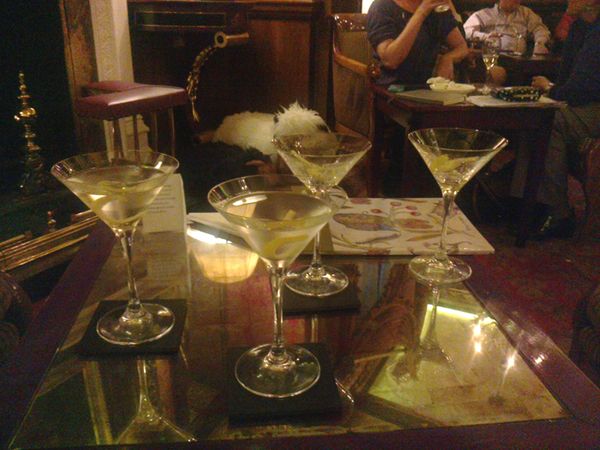Gin sales surge
Why does the passing of Margaret Thatcher on 8 April 2013, aged 87, make me think of gin? Don't get me wrong. I did not plan to join the hundreds of opponents of Margaret Thatcher for a "mass party" in London’s Trafalgar Square to celebrate her death on 13 April with a G&T (Gin and Tonic). I don't think it tasteful or called for to rejoice in her death, irrespective of what you think of her politics or legacy.
The reason I thought of gin was cultural. I have been wondering for a while why it is that gin is having a big renaissance of late? As far as I can see, it's become cool again to be seen drinking a G&T or a Martini, which is the classic gin cocktail with dry vermouth.
In the UK, gin sales are growing at 12 percent in pubs, bars and restaurants, and by 5 percent in off-licences and supermarkets, according to data from research group Nielsen. Especially artisanal gin seems to be the dernier cri as people in the UK have recently realised that gin can be a far more interesting drink than vodka.
The art historian and spirits consultant Owen Barstow says that London is having a gin revolution, not unlike the craft beer revolution. But while craft beers, on the whole – and I am phrasing this very cautiously – tend to go with a more progressive outlook on the part of the consumer (as well as their late-hippie brewers), gin – again, to me – in the UK mixes with a more conservative attitude.
In the case of the young, who drink gin, "conservative" is probably mostly a fashion statement. In the UK's very dynamic, fluid and pluralist popular culture, Mr Barstow says, "trends move into a reactionary mode especially in times of economic hardship, like ours today. That's why you will find a certain group of young, middle class, informed young people who define themselves as away from the mainstream by drinking gin, real ale, and tea; by wearing suits, ties, tweeds, and brogue shoes; and by listening to music by the male duo Hurts, who are an exact copy of Spandau Ballet, aka the brothers Kemp, from the 1980s."
In the 1980s, this group of youngsters would have been called "young fogeys" because of their vintage dress style and their erudite, conservative cultural pursuits. I don't know if the young fogeys of today would call themselves thus or know about their 1980s predecessors. Youth tends to have a short memory.
Whatever the case, there is no denying that currently in the UK among certain young people the tastes, fashions and music of the 1980s, which was a decade of severe economic hardship for many Britons, are being appropriated. Hence the surge in gin consumption. Mr Barstow tells me how recently he went to a London pub with his best friend and his son who is now at university in London. While the elders drank real ale or wine, the young man had three G&Ts made with some trendy gin. He actually asked in the pub which gins they stocked. He's 20 years old.
Those of us who remember the 1980s in the UK vividly, the decade will always be associated with Mrs Thatcher, or Mrs T as we called her, who was Britain’s prime minister from 1979 to 1990. Although the familiar landmarks of her tenure will surely loom largest – the savage battle over the economy in the early 1980s, the victory in the Falklands war in 1982, the bitter struggle with the miners in 1984/85, the deregulation of the City in 1986, the disastrous introduction of the poll tax, and the high drama of her resignation in 1990, according to the historian Dominic Sandbrook – it is for the effects of her divisive policies on social life in Britain that we cannot think of the 1980s without thinking of Mrs T. Let's face it: Because of her politics, in the north of England, whole communities died with the closing of industries, such as mining.
Already Mrs Thatcher's death has triggered a highly emotional debate over the lasting merits or damages of Thatcherism. Therefore, many suspect that the 1980s revival will cease to be merely a lifestyle thing and go much more mainstream, putting all those 1980s political and cultural issues back on the agenda.
I am not sure that marketers at Diageo, the world's major drinks group with gin brands Gordon's and Tanqueray, will agree to my cultural analysis as to why gin is so popular among the young. But they have certainly latched on the category's rising appeal.
Diageo have embarked upon an innovation drive behind Gordon’s. In March this year they launched a collection of flavoured gins, such as Gordon’s Crisp Cucumber. The group is also bringing back a limited edition version of Tanqueray Malacca, which it discontinued last decade, following demand from bartenders. As part of the marketing campaign, Diageo at the end of March had a two-day "pop-up" Tanqueray Gin Palace in an old store in London's Covent Garden.
Not to be outdone, France's Pernod Ricard group will open the Beefeater gin distillery experience in Kennington in South London later this year, which will offer visitors to the capital a chance to see the famous gin brand being made, as well as learning about the history of London gin. Pernod Ricard said sales of its Beefeater gin brand reached a record 2.5 million nine-litre cases last year .
By my last count, at least three microdistilleries have opened up in recent years in London: Sacred Microdistillery, The London Distillery Company and Sipsmith. Incidentally, Sipsmith turned the office of the late beer writer Michael Jackson into their gin distillery.
PS. Michael Jackson, being a Yorkshire man and member of the Labour Party, did not approve of Mrs T's politics. But he would secretly have approved of her fondness for a fortifying glass of whisky in the evening.

